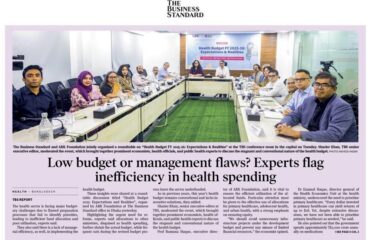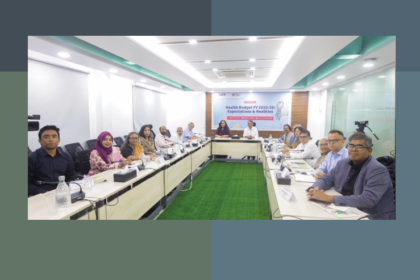
Report on Roundtable on ‘Health Budget FY2025-26: Expectations & Realities’
The national budget for FY 2025–26 in Bangladesh carries significant importance, as the country stands at a critical juncture in its journey toward a new era. Under the leadership of the interim government, Finance Advisor Dr. Saleh Uddin Ahmed unveiled a Tk 790 trillion national budget on June 3, 2025, with Tk 419 billion allocated to the health and family welfare sector. This marks an increase of Tk 50.1 billion compared to the actual allocation in FY 2024–25.
Despite this modest increase, experts caution that long-standing budgetary challenges are likely to persist. These challenges stem from flawed preparation processes that fail to accurately identify sectoral priorities, often resulting in inefficient allocation and underutilization of funds. For over two decades, health sector allocations have remained below 1% of GD, a figure well beneath both regional and global benchmarks. With SDG 3 (Good Health and Well-being) in focus, there is an urgent need for a comprehensive discussion on how to better align the national health budget with the needs of the population and broader development priorities.
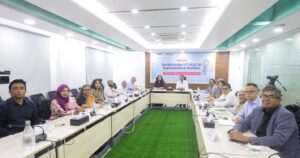
To address the pressing issues related to the national health budget and explore pathways forward, the ARK Foundation, in collaboration with The Business Standard, organized a roundtable discussion. The event brought together a diverse group of participants, including government officials, health economists, public health professionals, private sector representatives, development partners, and journalists, all contributing critical perspectives on the way ahead for Bangladesh’s health financing landscape.
Title of the Roundtable: Health Budget FY2025-26: Expectations & Realities
Date: June 3rd, 2025
Time: 10:30 AM – 01:00 PM
Overview
The discussion began with reflections on the current fiscal year’s health budget. Professor Rumana Huque, Executive Director of ARK Foundation, emphasized the critical importance of early investment in health, particularly from childhood to adolescence, noting that every USD 1 invested can yield a return of USD 10. She highlighted the need to shift the focus towards preventive and promotive care, especially within urban primary healthcare, and expressed hope that these priorities would be taken seriously by policymakers.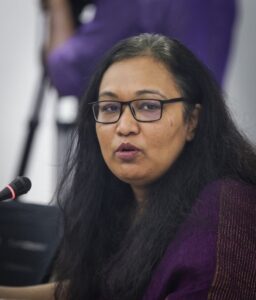
A recorded address from Professor Helen Elsey was then presented, in which she called for a reimagining of urban infrastructure with a focus on prevention to keep city residents healthy and able to avoid using the over-stretched health system for non-communicable disease care. She advocated for inclusive, safe and equitable approaches, especially for women, children, the elderly, and persons with disabilities. She proposed practical measures including the development of women-friendly recreational areas with green spaces, ramps, shaded seating, drinking water facilities, hygienic and accessible washrooms, and specialized walkways. Professor Helen further advocated for well-designed and wide footpaths with ramps and dedicated cycling lanes, reserved exclusively for physical activity. She also recommended providing adequate, alternative space for informal markets or vendors and restrictions on vehicle parking so places for walking and cycling can remain uninterrupted, for safe use by the public.
Professor Helen further advocated for well-designed and wide footpaths with ramps and dedicated cycling lanes, reserved exclusively for physical activity. She also recommended the removal of informal markets or vendors from these spaces to ensure uninterrupted, safe use by the public.
Dr. Md. Enamul Haque, Director General of the Health Economics Unit, Ministry of Health and Family Welfare (MoHFW), reiterated the value of investing in primary healthcare. Despite extensive policy discussions, he acknowledged that primary healthcare remains insufficiently prioritized. Dr. Haque noted that the government currently spends approximately Tk 2,000 crore annually on medications for hypertension and diabetes, constituting 5% of total pharmaceutical expenditures. Addressing budget inefficiencies, he stressed the importance of integrating primary healthcare within the Development Project Proposal (DPP) and establishing clear financing mechanisms within the ministry.
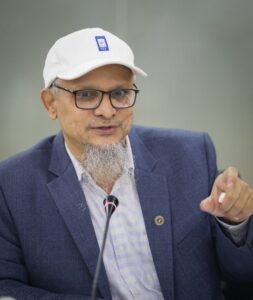 He remarked that the absence of a sound budgeting process hampers the ability to define priorities and efficiently utilize resources, leading to stagnation in the health sector. While welcoming the inclusion of medicines and vaccines in the revenue budget, he also highlighted the pressing need for skilled health managers to support reform implementation.
He remarked that the absence of a sound budgeting process hampers the ability to define priorities and efficiently utilize resources, leading to stagnation in the health sector. While welcoming the inclusion of medicines and vaccines in the revenue budget, he also highlighted the pressing need for skilled health managers to support reform implementation.
Speaking on non-communicable diseases (NCDs), Professor Dr. Syed Zakir Hossain, Line Director for NCD Control, reported that NCDs account for 51% of premature deaths in Bangladesh, yet only 4% of the national health budget is allocated to their management. He pointed to frequent medicine supply delays stemming from late budget disbursements and called for enhanced budget allocation, utilization, and monitoring mechanisms.
Public health expert Dr. MH Choudhury Lenin offered a critical view of the current budget, stating that it remains heavily focused on curative medical care, rather than a comprehensive healthcare approach. Despite the fact that 32% of the country’s population resides in urban areas, he highlighted the lack of accountability from the Ministry of Health and Family Welfare, with urban health responsibilities delegated to the Ministry of Local Government, Rural Development and Co-operatives.
He raised concerns that urban health initiatives remain limited to major cities such as Dhaka and Chattogram, leaving other urban areas underserved. Referring to the July Uprising of 2024, which marked a national call for transformative change, Dr. Lenin criticized the government’s failure to reassign responsibility for urban health to MoHFW, describing the decision as a missed opportunity and a policy-level oversight.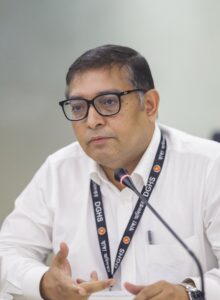
Mr. Fahim Mashroor, entrepreneur and CEO of BDJobs, discussed the role of the private sector in healthcare development. He pointed out the lack of incentives for private investors compared to other sectors where tax exemptions are common. According to him, the oligopolistic nature of the health market discourages foreign investment and limits transparency, with only a few dominant players in the sector.
Emphasizing the need for multisectoral collaboration, Mr. Mashroor proposed scaling up health insurance to reach the wider population and recommended involving the National Board of Revenue (NBR) in such efforts. He asserted that innovative financing models are essential for societal progress.
Advocate Syed Mahbubul Alam Tahin, representing the Center for Law and Policy Affairs, advocated for a “Health in All Policies” approach. Using air pollution as an example, he pointed out the tendency to seek medical solutions, such as nebulizers, without addressing environmental determinants or allocating adequate resources to the Ministry of Environment.
On the topic of urban nutrition, he recalled an earlier initiative where railways transported seasonal fruits to Dhaka, improving affordability and dietary diversity, despite incurring a Tk 20 million loss. He proposed that such initiatives be subsidized by MoHFW given their impact on public nutrition.
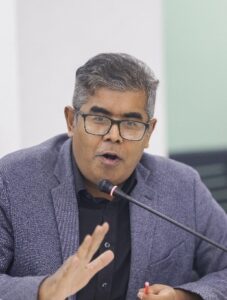 He also highlighted that poorly maintained footpaths hinder daily walking among NCD patients, a key aspect of non-pharmaceutical disease management. Tahin criticized the tendency to define health solely in medical terms and called for a comprehensive, inter-ministerial perspective that includes infrastructure, environment, and transport in the health discourse.
He also highlighted that poorly maintained footpaths hinder daily walking among NCD patients, a key aspect of non-pharmaceutical disease management. Tahin criticized the tendency to define health solely in medical terms and called for a comprehensive, inter-ministerial perspective that includes infrastructure, environment, and transport in the health discourse.
Representing Dhaka North City Corporation (DNCC), Dr. Mahmuda Ali provided updates on the city’s primary healthcare initiatives. She noted that DNCC is currently working on an extension of its primary healthcare project, set to conclude in June 2025.
She stated that a revised budget proposal has been submitted, aiming to expand coverage to underserved areas in Dhaka. She expressed optimism that the proposed scale-up would be approved in the upcoming fiscal year.
Addressing maternal and child health, prominent public health expert Dr. Halida Hanum Akhter, expressed concern over the decline in budget allocation despite persistently high maternal mortality rates. She noted that many women do not receive the recommended four antenatal care visits and urged that budget planning prioritize at-risk populations to reduce preventable deaths.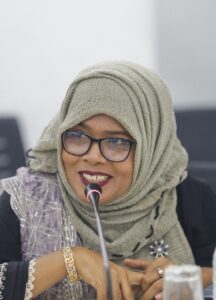
Professor Dr. Liaquat Ali, member of the Healthcare Reform Commission, addressed the implementation gap in the sector, particularly the lack of managerial capacity to execute budget provisions effectively. He commended recent steps including tax exemptions for insulin and cancer drugs, as well as tax relief for hospitals, but emphasized that these initiatives must be accompanied by strong monitoring systems to assess real-world impact. He underscored the importance of institutional accountability in ensuring that allocated resources translate into measurable public health outcomes.
Dr. Yasmin H. Ahmed, Project Adviser at Bangladesh Health Watch, reinforced the urgent need for practical implementation of the Healthcare Reform Commission’s recommendations. She emphasized that without tangible progress and institutional commitment, reforms will remain aspirational rather than transformative.
Samina Huque, Senior Project Manager at ARK Foundation, reflected on the essential role of the allied health workforce, including pharmacists, nurses, paramedics, Sub-Assistant Community Medical Officers (SACMOs), lab technicians, and support staff, as the backbone of service delivery, particularly at the grassroots.
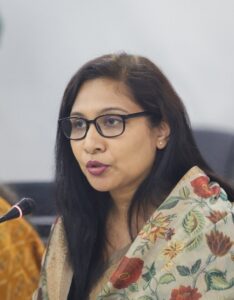 She also stressed the critical importance of community participation in the health budgeting process, urging the inclusion of local health workers, youth, and community representatives to ensure more responsive and equitable health financing.
She also stressed the critical importance of community participation in the health budgeting process, urging the inclusion of local health workers, youth, and community representatives to ensure more responsive and equitable health financing.
The session concluded with remarks from Fatema Kashfi, the young research representative from ARK Foundation, who highlighted the potential of artificial intelligence (AI) in the health sector. She noted that AI could help reduce the burden on healthcare facilities and ease the workload of doctors. Additionally, she emphasized the growing importance of telemedicine and other emerging technologies in improving healthcare delivery in Bangladesh, suggesting that their adoption could significantly enhance accessibility and efficiency across the system.
Key Lessons Learned
- Early and Preventive Investment Yields High Returns
- Investing in health from childhood to adolescence can yield significant returns (up to USD 10 per USD 1 spent).
- Prioritizing preventive and promotive care, especially in urban primary healthcare, is more cost-effective and impactful than reactive or curative approaches.
- Primary Healthcare Remains Undervalued
- Despite its high return on investment, primary healthcare continues to be deprioritized in national planning and budget allocation.
- Effective integration of primary care within the Development Project Proposal (DPP) and proper financing mechanisms are urgently needed.
- Need for a Holistic, Multisectoral Health Approach
- Health outcomes are not solely determined by medical care; they are shaped by environmental, infrastructural, and social factors.
- Issues like air pollution, nutrition, footpath design, and urban planning must be addressed collaboratively across ministries.
- The Allied Health Workforce is a Critical Pillar
- Pharmacists, nurses, paramedics, SACMOs, lab technicians, and support staff play a fundamental role in service delivery, especially at the grassroots.
- Their involvement in policy and budget preparation must be institutionalized.
- Urban Health Governance is Fragmented and Neglected
- While 32% of the population resides in urban areas, responsibility for their health remains unclear and fragmented between MoHFW and local government bodies.
- A clear, unified strategy is required to address urban health gaps beyond Dhaka and Chattogram.
- Managerial Capacity and Budget Execution are Weak
- Persistent issues with late fund releases, poor planning, and inefficient spending point to a lack of trained health managers and weak implementation capacity.
- Reform must include capacity-building in financial and health system management.
- Private Sector Engagement is Minimal and Needs Incentives
- Health remains unattractive to private investors due to limited incentives, oligopolistic structures, and regulatory opacity.
- Fiscal policies such as tax breaks, insurance schemes, and public-private partnerships should be leveraged to improve participation and transparency.
- Women’s and NCD Health Remain Underfunded
- Despite high maternal mortality and rising NCD burdens, these areas receive inadequate budget allocations.
- More targeted funding and service coverage are needed for antenatal care, NCD prevention, and women’s health services.
- Community Engagement in Budget Planning is Essential
- Budget processes must involve local health workers, youth, and community representatives to ensure allocations reflect real needs and realities.
- Such engagement strengthens ownership, equity, and accountability.
- Monitoring and Accountability Mechanisms Must Be Strengthened
- Initiatives such as tax exemptions on essential medicines are commendable, but without robust monitoring, their actual impact on public health remains uncertain.
- Hospitals and other service providers must be held accountable for delivering measurable outcomes.
Participants List
- Professor Helen Elsey, CHORUS Research Director; Professor of Global Public Health, University of York
- Professor Rumana Huque, Executive Director, ARK Foundation
- Enamul Haque, Director General, Health Economics Unit, DGHS
- Liaquat Ali, Member, Health Sector Reformation Commission, Govt. of Bangladesh
- Halida Hanum, Member, Women’s Affairs Reform Commission, Govt. of Bangladesh
- Muhammad Abdus Sabur, Public Health Expert
- Mahmuda Ali, Health Officer, Dhaka North City Corporation
- Syed Zakir Hossain, Line Director, Non-communicable Disease Control, DGHS
- Yasmin H. Ahmed, Project Advisor, Bangladesh Health Watch
- MH Choudhury Lenin, Public Health Expert
- Samia Afrin, Project Director, Naripokkho
- Mahbub Elahi Chowdhury, Scientist, ICDDR,B
- AKM Fahim Mashroor, CEO, BDJobs
- Syed Mahbubul Alam Tahin, Secretary, Center for Law and Policy Affairs
- Samina Huque, Senior Project Manager, ARK Foundation
- Fatema Kashfi, Senior Research Associate, ARK Foundation
Report Prepared by Abdullah M. Rafi

